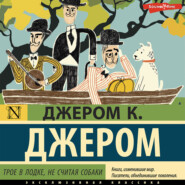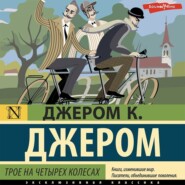По всем вопросам обращайтесь на: info@litportal.ru
(©) 2003-2024.
✖
Paul Kelver
Настройки чтения
Размер шрифта
Высота строк
Поля
“I beg your pardon,” retorted the large gentleman. “I thought you were asleep.”
“I think it very ill manners,” remarked the small gentlemen in the same slow and impressive tones, “for any gentleman to tell another gentleman, who happens to be wide awake, that he thought he was asleep.”
“Sir,” returned the massive gentleman, assuming with the help of a large umbrella a quite Johnsonian attitude, “I decline to alter my manners to suit your taste.”
“If you are satisfied with them,” replied the small gentleman, “I cannot help it. But I think you are making a mistake.”
“Does anybody know what the opera is about?” asked a bright little woman at the other end of the room.
“Does anybody ever know what a comic opera is about?” asked another lady, whose appearance suggested experience.
“I once asked the author,” observed a weary-looking gentleman, speaking from a corner. “His reply was: ‘Well, if you had asked me at the beginning of the rehearsals I might have been able to tell you, but damned if I could now!’”
“It wouldn’t surprise me,” observed a good-looking gentleman in a velvet coat, “if there occurred somewhere in the proceedings a drinking chorus for male voices.”
“Possibly, if we are good,” added a thin lady with golden hair, “the heroine will confide to us her love troubles, which will interest us and excite us.”
The door at the further end of the room opened and a name was called. An elderly lady rose and went out.
“Poor old Gertie!” remarked sympathetically the thin lady with the golden hair. “I’m told that she really had a voice once.”
“When poor young Bond first came to London,” said the massive gentleman who was sitting on my left, “I remember his telling me he applied to Lord Barrymore’s ‘tiger,’ Alexander Lee, I mean, of course, who was then running the Strand Theatre, for a place in the chorus. Lee heard him sing two lines, and then jumped up. ‘Thanks, that’ll do; good morning,’ says Lee. Bond knew he had got a good voice, so he asked Lee what was wrong. ‘What’s wrong?’ shouts Lee. ‘Do you think I hire a chorus to show up my principals?’”
“Having regard to the company present,” commented the fishy-eyed gentleman, “I consider that anecdote as distinctly lacking in tact.”
The feeling of the company appeared to be with the fish-eyed young man.
For the next half hour the door at the further end of the room continued to open and close, devouring, ogre-fashion, each time some dainty human morsel, now chorus gentleman, now chorus lady. Conversation among our thinning ranks became more fitful, a growing anxiety making for silence.
At length, “Mr. Horace Moncrieff” called the voice of the unseen Charon. In common with the rest, I glanced round languidly to see what sort of man “Mr. Horace Moncrieff” might be. The door was pushed open further. Charon, now revealed as a pale-faced young man with a drooping moustache, put his head into the room and repeated impatiently his invitation to the apparently coy Moncrieff. It suddenly occurred to me that I was Mr. Horace Moncrieff.
“So glad you’ve found yourself,” said the pale-faced young man, as I joined him at the door. “Please don’t lose yourself again; we’re rather pressed for time.”
I crossed with him through a deserted refreshment bar – one of the saddest of sights – into a room beyond. A melancholy-looking gentleman was seated at the piano. Beside him stood a tall, handsome man, who was opening and reading rapidly from a bundle of letters he held in his hand. A big, burly, bored-looking gentleman was making desperate efforts to be amused at the staccato conversation of a sharp-faced, restless-eyed gentleman, whose peculiarity was that he never by any chance looked at the person to whom he was talking, but always at something or somebody else.
“Moncrieff?” enquired the tall, handsome man – whom I later discovered to be Mr. Hodgson, the manager – without raising his eyes from his letters.
The pale-faced gentleman responded for me.
“Fire away,” said Mr. Hodgson.
“What is it?” asked of me wearily the melancholy gentleman at the piano.
“‘Sally in Our Alley,’” I replied.
“What are you?” interrupted Mr. Hodgson. He had never once looked at me, and did not now.
“A tenor,” I replied. “Not a full tenor,” I added, remembering the O’Kelly’s instructions.
“Utterly impossible to fill a tenor,” remarked the restless-eyed gentleman, looking at me and speaking to the worried-looking gentleman. “Ever tried?”
Everybody laughed, with the exception of the melancholy gentleman at the piano, Mr. Hodgson throwing in his contribution without raising his eyes from his letters. Throughout the proceedings the restless-eyed gentleman continued to make humorous observations of this nature, at which everybody laughed, excepting always the melancholy pianist – a short, sharp, mechanical laugh, devoid of the least suggestion of amusement. The restless-eyed gentleman, it appeared, was the leading low comedian of the theatre.
“Go on,” said the melancholy gentleman, and commenced the accompaniment.
“Tell me when he’s going to begin,” remarked Mr. Hodgson at the conclusion of the first verse.
“He has a fair voice,” said my accompanist. “He’s evidently nervous.”
“There is a prejudice throughout theatrical audiences,” observed Mr. Hodgson, “in favour of a voice they can hear. That is all I am trying to impress upon him.”
The second verse, so I imagined, I sang in the voice of a trumpet. The burly gentleman – the translator of the French libretto, as he turned out to be; the author of the English version, as he preferred to be called – acknowledged to having distinctly detected a sound. The restless-eyed comedian suggested an announcement from the stage requesting strict silence during my part of the performance.
The sickness of fear was stealing over me. My voice, so it seemed to me, disappointed at the effect it had produced, had retired, sulky, into my boots, whence it refused to emerge.
“Your voice is all right – very good,” whispered the musical conductor. “They want to hear the best you can do, that’s all.”
At this my voice ran up my legs and out of my mouth. “Thirty shillings a week, half salary for rehearsals. If that’s all right, Mr. Catchpole will give you your agreement. If not, very much obliged. Good morning,” said Mr. Hodgson, still absorbed in his correspondence.
With the pale-faced young man I retired to a desk in the corner, where a few seconds sufficed for the completion of the business. Leaving, I sought to catch the eye of my melancholy friend, but he appeared too sunk in dejection to notice anything. The restless-eyed comedian, looking at the author of the English version and addressing me as Boanerges, wished me good morning, at which the everybody laughed; and, informed as to the way out by the pale-faced Mr. Catchpole, I left.
The first “call” was for the following Monday at two o’clock. I found the theatre full of life and bustle. The principals, who had just finished their own rehearsal, were talking together in a group. We ladies and gentlemen of the chorus filled the centre of the stage. I noticed the lady I had heard referred to as Gertie; as also the thin lady with the golden hair. The massive gentleman and the fishy-eyed young man were again in close proximity; so long as I knew them they always were together, possessed, apparently, of a sympathetic antipathy for each other. The fishy-eyed young gentleman was explaining the age at which he thought decayed chorus singers ought, in justice to themselves and the public, to retire from the profession; the massive gentleman, the age and size at which he thought parcels of boys ought to be learning manners across their mother’s knee.
Mr. Hodgson, still reading letters exactly as I had left him four days ago, stood close to the footlights. My friend, the musical director, armed with a violin and supported by about a dozen other musicians, occupied the orchestra. The adapter and the stage manager – a Frenchman whom I found it good policy to mistake for a born Englishman – sat deep in confabulation at a small table underneath a temporary gas jet. Quarter of an hour or so passed by, and then the stage manager, becoming suddenly in a hurry, rang a small bell furiously.
“Clear, please; all clear,” shouted a small boy, with important air suggestive of a fox terrier; and, following the others, I retreated to the wings.
The comedian and the leading lady – whom I knew well from the front, but whom I should never have recognised – severed themselves from their companions and joined Mr. Hodgson by the footlights. As a preliminary we were sorted out, according to our sizes, into loving couples.
“Ah,” said the stage manager, casting an admiring gaze upon the fishy-eyed young man, whose height might have been a little over five feet two, “I have the very girl for you – a beauty!” Darting into the group of ladies, he returned with quite the biggest specimen, a lady of magnificent proportions, whom, with the air of the virtuous uncle of melodrama, he bestowed upon the fishy-eyed young man. To the massive gentleman was given a sharp-faced little lady, who at a distance appeared quite girlish. Myself I found mated to the thin lady with the golden hair.
At last complete, we took our places in the then approved semi-circle, and the attenuated orchestra struck up the opening chorus. My music, which had been sent me by post, I had gone over with the O’Kelly, and about that I felt confident; but for the rest, ill at ease.
“I am afraid,” said the thin lady, “I must ask you to put your arm round my waist. It’s very shocking, I know, but, you see, our salary depends upon it. Do you think you could manage it?”
I glanced into her face. A whimsical expression of fun replied to me and drove away my shyness. I carried out her instructions to the best of my ability.
The indefatigable stage manager ran in and out among us while we sang, driving this couple back a foot or so, this other forward, herding this group closer together, throughout another making space, suggesting the idea of a sheep-dog at work.
“Very good, very good indeed,” commented Mr. Hodgson at the conclusion. “We will go over it once more, and this time in tune.”
“And we will make love,” added the stage manager; “not like marionettes, but like ladies and gentlemen all alive.” Seizing the lady nearest to him, he explained to us by object lesson how the real peasant invariably behaves when under influence of the grand passion, standing gracefully with hands clasped upon heart, head inclined at an angle of forty-five, his whole countenance eloquent with tender adoration.
“If he expects” remarked the massive gentleman sotto voce to an experienced-looking young lady, “a performance of Romeo thrown in, I, for one, shall want an extra ten shillings a week.”
Casting the lady aside and seizing upon a gentleman, our stage manager then proceeded to show the ladies how a village maiden should receive affectionate advances: one shoulder a trifle higher than the other, body from the waist upward gently waggling, roguish expression in left eye.
“Ah, he’s a bit new to it,” replied the experienced young lady. “He’ll get over all that.”

















